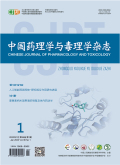中国药理学与毒理学杂志2024,Vol.38Issue(4):265-278,14.DOI:10.3867/j.issn.1000-3002.2024.04.004
重组人胸腺素β4对急性放射损伤小鼠多组织中炎症小体和凋亡相关基因表达的影响
Effect of recombinant human thymosin β4 on expressions of inflammasome and apoptosis-related genes in multiple tissues of mice with acute radiation injury
摘要
Abstract
OBJECTIVE To investigate the effect of recombinant human thymosin β4(rh-Tβ4)on inflammasome and apoptosis related genes in the small intestine,lung and brain tissues of mice with acute radiation injury.METHODS C57BL/6N mice were randomly divided into the normal control group,radiation-induced injury model group and model+rh-Tβ4 group.In the model group,8 Gy60 Co γ-rays were used to irradiate C57BL/6N mice with a single whole-body irradiation to establish an acute radiation injury model,and mice in the model+rh-Tβ4 group was given rh-Tβ4 5 μg·kg-1 after 24 h of irradiation,once a day,and administration was discontinued for 3 d.Mice in the model+rh-Tβ4 group was given rh-Tβ4 5 μg·kg-1 after 24 h of irradiation.Inflammatory cytokines such as tumor necrosis factor-α(TNF-α),interleukin-18(IL-18),IL-4,IL-13 and transforming growth factor-β(TGF-β)in small intestine,lung and brain tissues were detected by radioimmunoassay.Besides inflammasome and apoptosis related genes in the above tissues were detected by inflammasome and apoptosis PCR microarrays before some differential genes were selected and validated by RT-qPCR.RESULTS The results of inflammatory cytokine assay showed that TNF-α,TGF-β and IL-18 in the small intestine,lung and brain tissues were significantly higher in the radiation-induced injury model group compared with the normal control group(P<0.05,P<0.01).rh-Tβ4 signiifcantly reduced TNF-α in the small intestine,lung and brain tissues(P<0.05),and TGF-β and IL-18 in the small intestine and brain tissues(P<0.05,P<0.01).The results of inflammosome PCR chip showed that there were 13 different genes in the small intestine tissue,9 differential genes in the lung tissue,and 11 differential genes in the brain tissue of mice in the radiation-induced injury model group compared with that of the normal control group.Compared with the radiation-induced injury model group,there were 1 differential gene in the small intestine tissue,4 differential genes in the lung tissue,and 20 differential genes in the brain tissue of mice in the model+rh-Tβ4 group.Compared with the normal control group,there were a total of 5 differ-ential genes in the small intestine tissue,3 differential genes in the lung tissue,and 3 differential genes in the brain tissue of mice in the model+rh-Tβ4 group.The genes verified by RT-qPCR which showed significant differences between groups and with the same trend as inflammosome PCR array were as follows:in the small intestine tissue,the inflammasome negative gene Bcl2-like 1(Bcl2l1)mRNA was significantly downregulated in the radiation-induced injury model group compared with the normal control group(P<0.01),and this gene was significantly upregulated in the model+rh-Tβ4 group compared with the radiation-induced injury model group(P<0.05),but there was no significant difference with the normal control group.In brain tissue,the inflammasome-related gene NMR family apoptosis inhibitor protein 1(Naip1),the negative regulatory gene MEFV innate immunomodulatory factor(Mefv)and tumor necrosis factor ligand superfamily member 11(Tnfsf11)mRNA were significantly upregulated in the radiation-induced injury model group compared with the normal control group(P<0.05).Tnfsf11 mRNA was significantly downregulated in the model + rh-Tβ4 group compared with the radiation-induced injury model group(P<0.05).The results of apoptosis PCR chip showed that there were 3 differ-ential genes in the small intestinal tissue,6 differential genes in the lung tissue,and 12 differential genes in the brain tissue of mice in the radiation injury model group compared with the normal control group.Compared with the radiation injury model group,there were no differential genes in the small intestine and lung tissues,and 4 differential genes in the brain tissue of mice in the model+rh-Tβ4 group.Compared with the normal control group,there were a total of 10 differential genes in the small intestine tissue,4 differential genes in the lung tissue,and 1 differential gene in the brain tissue of mice in the model+rh-Tβ4 group.The genes verified by RT-qPCR which showed significant differences between groups and with the same trend as apoptosis PCR array were as follows:in the lung tissue,the anti-apoptotic gene tumor necrosis factor Tnfsf10 mRNA was significantly upregulated in the radia-tion-induced injury model group compared with the normal control group(P<0.01),but significantly downregulated in the model+rh-Tβ4 group compared with the radiation-induced injury model group(P<0.05),as in the normal control group.The anti-apoptotic gene CD40 ligand(Cd40lg)mRNA was signifi-cantly downregulated in the radiation-induced injury model group and model+rh-Tβ4 group compared with the normal control group(P<0.01).The pro-apoptotic gene apoptosis related factor ligand(Fasl)was significantly downregulated in the radiation-induced injury model group compared with the normal control group(P<0.05),and significantly upregulated in the model+rh-Tβ4 group compared with the radiation-induced injury model group(P<0.05).In the brain tissue,the anti-apoptotic gene Tnfsf10 mRNA was significantly upregulated in the radiation-induced injury model group compared with the normal control group(P<0.05),but significantly downregulated in the model+rh-Tβ4 group compared with the radiation-induced injury model group(P<0.05).The anti-apoptotic gene Cd40lg was significantly down-regulated in the radiation-induced injury model group compared with the normal control group(P<0.05),but significantly upregulated in the model+rh-Tβ4 group compared with the radiation-induced injury model group(P<0.05),as in the normal control group.CONCLUSION rh-Tβ4 can inhibit the increase of pro-inflammatory cytokines induced by irradiation,and regulate inflammasome and apoptosis related gene expressions in the small intestine,lung and brain tissues of mice with acute radiation injury.关键词
重组人胸腺素β4/放射损伤/细胞因子/炎症小体/细胞凋亡Key words
recombinant human thymosin β4/radiation injury/inflammatory cytokines/inflamma-some/apoptosis分类
医药卫生引用本文复制引用
王勇懿,周平坤,叶雨萌,李小宇,王雪佳,段敏,杨雪枫,左红艳,郝延辉,李杨..重组人胸腺素β4对急性放射损伤小鼠多组织中炎症小体和凋亡相关基因表达的影响[J].中国药理学与毒理学杂志,2024,38(4):265-278,14.基金项目
国家科技重大专项(2018ZX09J18103-006) National Science and Technology Major Projec of China(2018ZX09J18103-006) (2018ZX09J18103-006)

